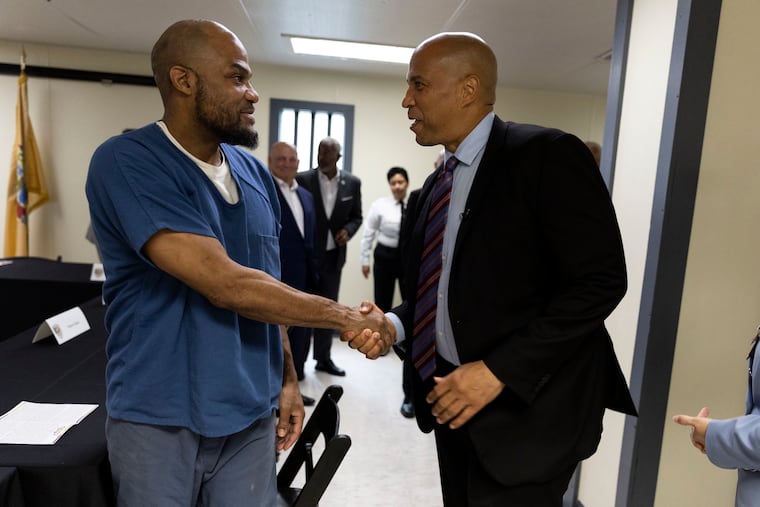Cory Booker is holding up a Camden jail as a national model for addiction treatment
Federal limitations on the use of Medicaid to cover health care in jails and prisons are a challenge to treating addiction among inmates.

U.S. Sen. Cory Booker is so impressed by the Camden County Correctional Facility’s programs to treat addiction among incarcerated people that he wants the nation to follow its example.
That’s why Booker visited the jail Monday to highlight a bill he is sponsoring that would defray the costs of addiction and mental health treatment for inmates by allowing jails and prisons to use Medicaid to cover these services. By federal law, the publicly funded health program for low-income people is barred from covering most health care in jails and prisons.
In 2019, Camden became the first jail in the state to offer all three federally approved medication options to treat opioid addiction: methadone and buprenorphine, both opioid-based medications, and naltrexone, which blocks opioids from latching onto receptors in the brain.
The county jail also screens every newly incarcerated person for substance use disorder and, if they ask for treatment, aims to get them on medication within 24 to 48 hours. Previously, most people with opioid addiction were forced to detox, cold-turkey, in jail — as is still the case in many other jails.
“It’s a damn shame that this is the exception and not the rule,” said Booker (D., N.J.).
Colleen Duca, who is incarcerated at the county jail, said she also served time there before addiction treatment was available. Without such support, she overdosed almost immediately after leaving.
The days following an incarceration are especially fraught for people in addiction. After a period of abstinence, many lose their tolerance for opioids. Those who return to using drugs might overestimate how much they can handle, putting them at a higher risk for a fatal overdose, especially given the rise of the deadly synthetic opioid fentanyl.
Now on methadone and in recovery for the last two years, Duca expects that her next transition back to life in the community will be easier because she was able to receive her treatment in jail.
“Your life is completely different — it’s amazing,” she said.
Lamon Hill, who has been in recovery for 60 days, said health providers at the jail had introduced him to naltrexone.
“Had it not been for the doctor asking me whether I wanted to get on the medication, I wouldn’t have known a thing about it,” he said. “Now, it’s a whole different story. The cravings of my addiction; [naltrexone] is helping to block it.”
‘We need changes in the federal legislation’
Because of the federal regulations around Medicaid use in jails, such treatments are expensive, jail officials said.
Since 2019, Camden County has spent more than $1.2 million on addiction treatment medications for more than 3,500 inmates, paid for mostly through state grants, Warden Karen Taylor said in an interview in January. Sublocade, a version of buprenorphine delivered in the form of a monthly shot, costs the jail $1,800 for a single dose. Many patients prefer it because they don’t have to take a daily medication.
Taylor said she was committed to continuing the program, because she’s seen how it improves inmates’ lives: “If I start a program, we’re not stopping it because of funding,” she said at Monday’s event.
Now county officials hope to use Medicaid to cover some inmates’ treatments, which would free up funding to allow the county to offer more services for incarcerated people upon their release, like transitional housing.
“Corrections is the single largest expense in Camden County. We need changes in the federal legislation,” County Commissioner Jeff Nash told Booker.
This spring, the federal government said they would allow states to apply for a waiver to use Medicaid to cover some health-care costs for inmates up to 90 days before their release, in an effort to ensure they had stable health care upon leaving jail or prison.
Under the new proposed legislation, Booker and the bill’s cosponsors seek to let jails and prisons use Medicaid to cover mental health and substance use services for the entirety of a person’s jail or prison term.
States who opt into the program would also get higher Medicaid reimbursements from the federal government.
Booker, who is on a tour of the state’s 21 counties, said he had appreciated the opportunity to talk with both jail officials and people involved in the jail’s treatment program.
“This institution has become a national model — and to hear directly from people who are incarcerated here, it just gives you even more of an affirmation of the urgency of this program,” he said.